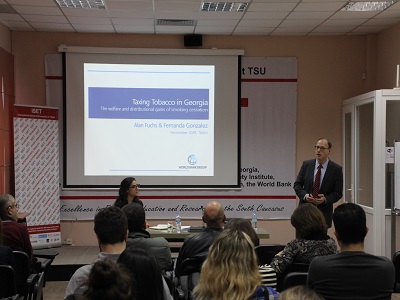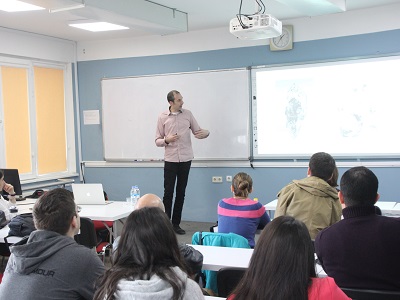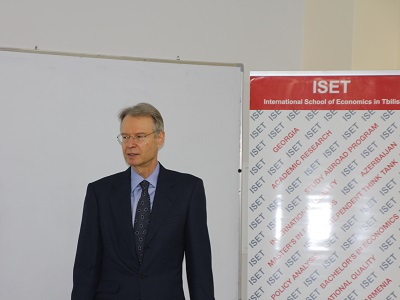On November 19, ISET was visited by Mr. Alan Fuchs of the World Bank Group, whose presentation, 'Taxing Tobacco in Georgia: The welfare and distributional gains of quitting smoking’, delved into the welfare and distributional impact of increasing taxes on tobacco in Georgia.
A large portion of Georgia’s population smoke, despite its long-proven negative health effects; approximately eight million deaths per year are attributed to tobacco consumption. As Mr. Fuchs stated, Georgia faces significant health, economic and social costs due to the prevalence of cigarette smoking.
Mr. Fuchs’ presentation examined how raising taxes on tobacco products can be an effective way of reducing smoking. The World Bank used an Extended Cost-Benefit Analysis (ECBA) method to simulate the welfare and distributional impact of raising the price of cigarettes, which showed that poorer households have a tendency to reduce their tobacco consumption when faced with higher prices of cigarettes. However, although the same ECBA method was used by the World Bank in similar studies in Russia, Chile, South Africa, Myanmar and Indonesia, the studies differed according to the datasets available. In some countries (such as Russia and South Africa) the datasets were widespread and informative, but others (including Georgia) were far less complete, making the results somewhat less reliable.
On the 13th of November, ISET was visited by Joey Cherdarchuk of Darkhorse Analytics, a Canadian company specializing in data science and information design. The firm is dedicated to helping organizations and individuals present their data in a clear and understandable way; in an often humorous and highly informative workshop, Mr. Cherdarchuk demonstrated how failures in data presentation can be misleading (wilfully or otherwise) and inaccurate. Mr. Cherdarchuk’s seminar formed a part of the larger Effective Data Visualization workshop hosted within ISET’s Modern Data Analysis (MDA) concentration.
The workshop, colourfully entitled ‘Data Looks Better Naked’, Mr. Cherdarchuk explained that raw data can be compared to an uncut diamond – the information needs to be crafted in order for it to be presented in its best form. This idea is highly applicable to economists attempting to present their research, facts and figures to a general audience who may not be familiar with the more intricate complexities of economics.
On November 8, ISET was visited by Mr. Juha Kahkonen, Deputy Director of the Middle East and Central Asia Department of the IMF, who gave a presentation on the fact that global trade tensions and slowing growth amongst key trading partners are affecting the Caucasus and Central Asia (CCA) region. However, Mr Kakhonen explained that despite a decline in export growth, a looser fiscal stance and rising retail credit is expected to maintain a broadly stable growth for the region in 2019–20
The IMF’s CCA Deputy Director then examined the issues in-depth and stated that in order to foster higher and more inclusive growth and raise living standards, CCA policymakers should strengthen competitiveness, leverage comparative advantages, and foster diverse sources of growth to reap the gains from trade and integration into global value chains. In addition, revitalizing FDI by easing restrictions and promoting macroeconomic stability while deepening domestic financial markets can provide more stable sources of funding, mitigating the risk of volatile portfolio flows. These portfolio flows to the region’s economies are nearly twice as sensitive to global market sentiment compared to other emerging economies, exposing the region to abrupt shifts.













